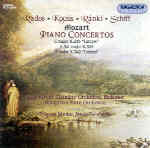Focus your attention first on the featured soloists’ lively interplay and frisky energy throughout the concerto for two pianos. It makes for infectious listening. The soloists, Zoltán Kocsis and Dezsó Ránki, are further graced by sturdy, sympathetic orchestral support, with plenty of detail to satisfy the fussiest Mozartean palette (the lovely wind solos, the perfectly voiced string pizzicato accompaniments in the first movement). Then notice the 1972 recording date. Barely out of their teens, Kocsis and Ránki already were world-class pianists. So was a 19-year-old hotshot named András Schiff, who makes the most out of the third piano’s admittedly limited contributions in the F major concerto.
Performance-wise, the solo C major K. 246 proves this disc’s weak link, due to the Liszt Ferenc Chamber Orchestra’s scrawny string tone and inconsistent intonation, plus Frigyes Sándor’s solid but comparatively ordinary pianism, next to, say Kempff’s refined, inwardly sculpted account (DG), or the spirited, audacious Zitterbart/Fey collaboration (Hänssler). While the masterly and mature Perahia/Lupu Mozart Two-Piano Concerto still tops my reference list, consider Kocsis and Ránki as well.
































